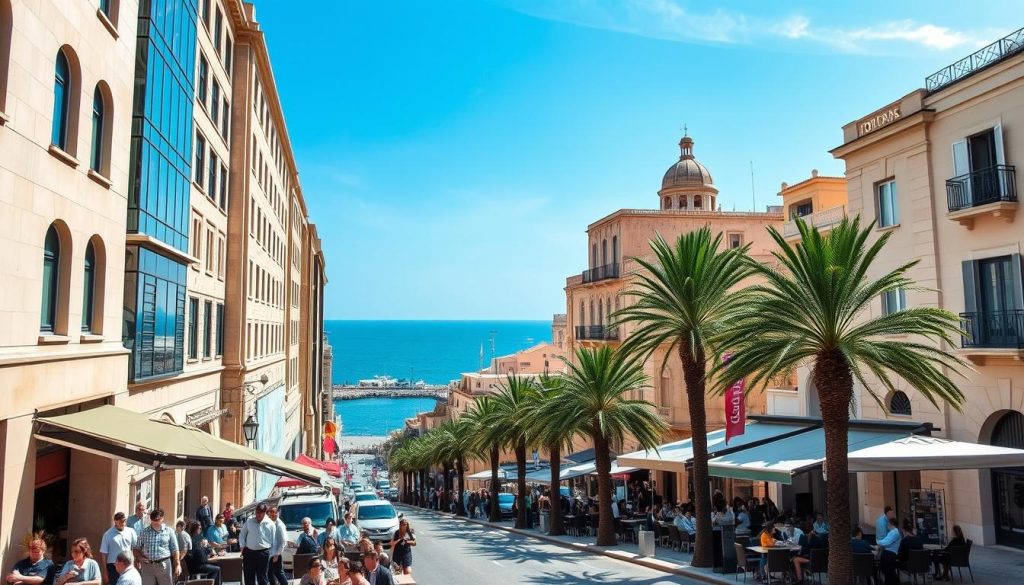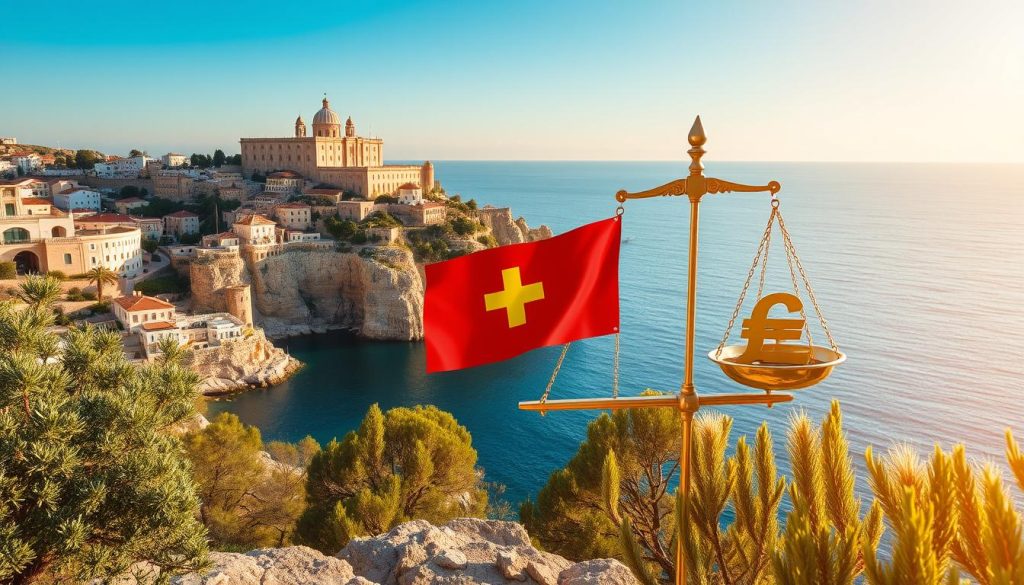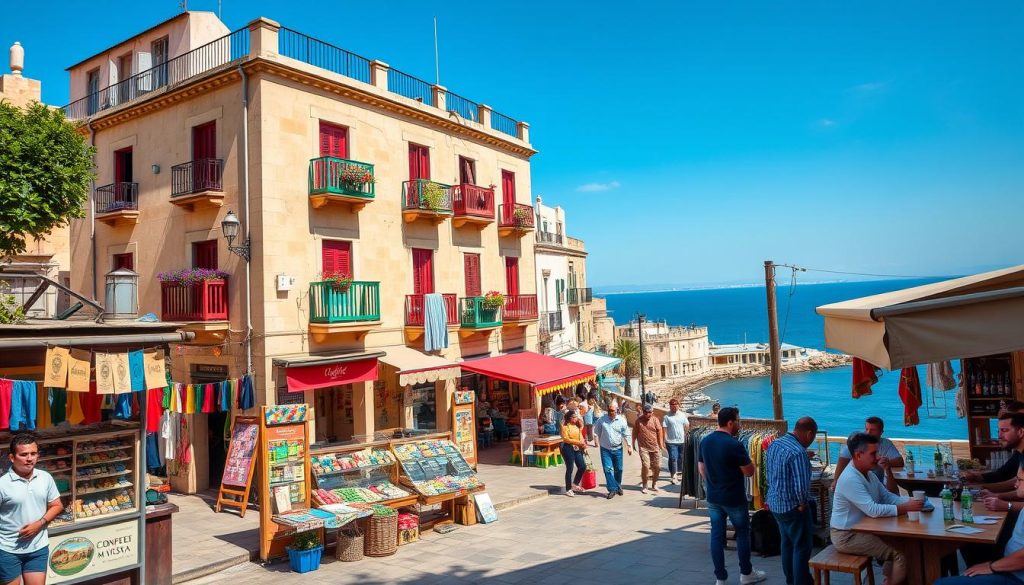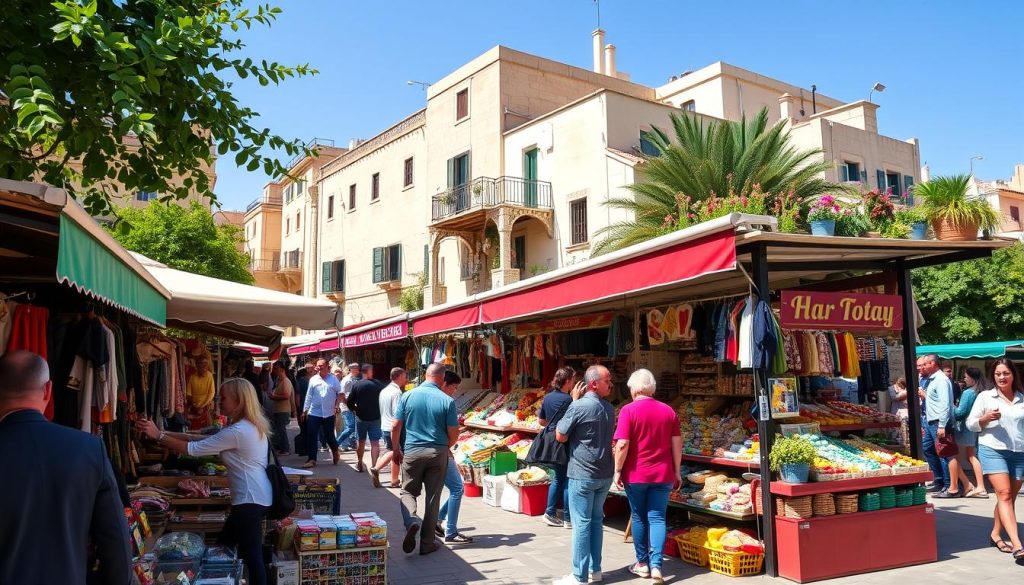In recent years, Malta has become a key spot for international business. It attracts entrepreneurs with its great location and good conditions for work. This guide will help investors understand the business scene in Malta.
It will show the benefits of Malta’s business-friendly environment and strong rules for growth. We’ll look at the Malta economy, legal systems, and market chances. We’ll also talk about how to succeed in Malta by making smart choices and building networks.
Introduction to Malta’s Business Environment

Malta’s business scene is lively and full of chances for growth. It has a clear and quick regulatory system. This makes it a great spot for foreign investors.
Malta is also well-placed in the Mediterranean. It acts as a bridge to Europe and North Africa. This is a big plus for businesses.
Malta’s economy is strong in finance, ICT, and maritime. It has good infrastructure, a skilled workforce, and trade agreements. These help businesses stay ahead.
To wrap it up, Malta is a great place for international companies. It has good economic conditions and government support. This makes Malta a top choice for business growth.
Understanding the Maltese Economy

The Maltese economy is strong and varied, thanks to its location in the Mediterranean. An economic overview Malta shows a country growing fast. Its GDP has seen steady increases, thanks to a strong service sector.
This sector includes tourism, financial services, and IT. These areas are key to Malta’s economy.
Tourism is a big help, bringing in millions of visitors each year. It adds a lot to Malta’s GDP. The financial services sector also boosts the economy with international investments.
Foreign direct investment (FDI) is crucial for Malta. It brings in money and skills, helping local industries grow. This has led to more jobs and stability in the economy.
Malta’s economy is quick to adapt to challenges. This helps it keep doing well.
Legal Framework for Businesses in Malta

Starting a business in Malta means knowing the legal rules for companies. Business law in Malta covers many rules to keep businesses in order. These include registering companies, protecting intellectual property, and following EU rules.
Looking into Malta company law is crucial. There are different legal setups like limited liability companies and partnerships. Choosing the right one can change how a business works and its taxes.
- Company Registration: Registering a business means giving the Malta Business Registry the needed documents. This makes sure you follow local laws.
- Intellectual Property Rights: Keeping your ideas safe is key to staying ahead. Malta has strong laws for trademarks, patents, and copyrights.
- Compliance with EU Regulations: Malta’s laws must follow EU rules. This affects things like data protection, consumer rights, and competition law.
Staying legal in Malta is key for a business’s good name. Business owners must keep up with law changes. Knowing these rules is essential for running a business well in Malta.
Doing Business in Malta: Key Regulations and Compliance

For entrepreneurs, knowing the business laws in Malta is key. It helps them set up in this lively economy. Malta’s laws aim to ensure fairness, safety, and care for the environment.
Key areas of focus include:
- Data Protection Laws: Companies must follow strict rules on personal data. This is in line with the General Data Protection Regulation (GDPR).
- Health and Safety Regulations: Malta’s business standards require a safe workplace. This reduces risks and protects employees.
- Employment Laws: Businesses need to know local employment laws. This includes fair pay, contracts, and work conditions.
Staying compliant in Malta boosts a company’s reputation. It also makes the business more legitimate and sustainable. Entrepreneurs new to Malta’s laws should seek legal advice. Working with experts who understand Malta’s business standards is wise for success.
Tax Advantages for Companies in Malta

The Malta tax system is very good for companies wanting to invest and work here. We’ll look at corporate tax Malta and VAT Malta. We’ll also talk about the many tax breaks for businesses.
Corporate Tax Rates and Incentives
Malta has a standard corporate tax rate of 35%. This is quite low compared to other European countries. But, there are many tax breaks that can really cut down what companies pay in taxes.
Investing in certain areas can even lead to tax refunds. This can make the effective tax rate as low as 5% in some cases.
- Tax incentives for specific industries, such as technology and manufacturing
- Investment tax credits for qualifying expenditures
- Access to EU funding encouraging research and development
Value Added Tax (VAT) Regulations
The VAT Malta rate is 18%, which applies to most goods and services. Some products and services don’t have to pay VAT, which is a big help for businesses. It’s important to know these rules for good financial planning and following the law.
- Reduced rates of 7% for hotel accommodations
- Exemptions for education and healthcare services
- Possibility of claiming VAT refunds for eligible purchases
Starting a Business in Malta

Starting a business in Malta means understanding important steps and choices. The first step is registering your business, which needs specific documents. Choosing the right business structure is also key. It affects your taxes and how much you’re personally responsible for.
Business Registration Process
The first step is to reserve a company name with the Malta Business Registry. This ensures your name is unique. After approval, you’ll need to prepare documents like a memorandum and articles of association. You also have to pay a registration fee, which varies based on your business type.
Choosing the Right Business Structure
Picking the right business structure is crucial for managing your business well and protecting yourself. Each type, like a sole proprietorship, partnership, or limited company, has its own rules and benefits. For example, a limited company can protect your personal assets. Knowing your business needs helps you choose the best structure and follow Maltese laws.
Market Insights: Opportunities in Malta

Malta offers a variety of market opportunities for investors. Its economy is growing, and different business sectors are thriving. This makes it a great place for innovation and growth.
The financial services sector is booming, thanks to good regulations and a skilled workforce. The gaming industry is also doing well, with Malta being a key player. Plus, the tech sector is growing fast, offering chances for startups and big companies.
Sustainable energy is becoming more important in Malta, following global trends. This means there are opportunities for businesses in renewable energy and energy-saving tech.
- Financial Services
- Gaming Industry
- Technology Startups
- Sustainable Energy
- Tourism Diversification
The tourism sector is changing, with a need to attract more visitors. This opens up chances in areas like eco-tourism and cultural experiences. These are in line with what people want to see when they travel.
Investors looking into Malta should really understand the market. Knowing what opportunities are available can help them succeed in this competitive field.
A Guide to Networking and Building Relationships in Malta

Building a strong network is key to success in Malta’s lively business scene. Making important business connections can open doors to new chances, partnerships, and knowledge. There are many ways to network well, like going to business events and joining local groups.
Participating in Business Events
Going to local business events like trade fairs, conferences, and workshops is a great way to network in Malta. These events let you meet possible clients and partners. They also keep you up-to-date with the latest in your field. The main advantages are:
- Meeting a wide range of businesses
- Showing off what you offer
- Building trust and working together face-to-face
Leveraging Local Associations and Chambers of Commerce
Local associations and chambers of commerce are crucial for growing business ties in Malta. They provide tools, support, and networking chances specific to certain sectors. Joining these groups brings benefits like:
- Special events and seminars
- Meeting with experienced professionals
- Learning about market needs and rules
Understanding the Workforce in Malta

The Malta workforce is known for its high education levels and many languages spoken. As businesses grow, knowing the labour laws and employment rules in Malta is crucial. This knowledge helps keep everyone in line and makes work better for everyone.
Labour Laws and Employment Regulations
Labour laws in Malta set clear rules for work. Key points include:
- Fair pay and benefits
- Rules for health and safety
- Protection for employees
These rules help make work places fair. They help employees stay productive and happy.
Finding Skilled Talent in Malta
Attracting skilled workers in Malta can be both easy and hard. Companies can try a few things:
- Work with local universities for internships
- Offer good pay and benefits
- Use online job sites to find more people
By trying these methods, businesses can find the right people. These people can help Malta’s economy grow and thrive.
Challenges of Doing Business in Malta

Starting a business in Malta comes with its own set of hurdles. Knowing these challenges can help in planning and managing risks.
Bureaucratic processes can slow down decision-making. Getting licenses and permits can take time, affecting efficiency. This is especially tough for new businesses in strict sectors.
Another issue is market saturation. Places like tourism and IT are very competitive. It’s crucial to find a unique spot in the market to stand out.
- Effective market research to understand local demand
- Establishing unique selling propositions to distinguish offerings
Getting skilled workers is hard due to high demand. This can lead to high salaries, straining budgets. It’s a challenge for businesses to find and keep good staff.
To tackle these problems, planning is key. Having backup plans for unexpected issues is important. Getting advice from local experts can also help navigate Malta’s business world.
Marketing Your Business in the Maltese Market

To succeed in Malta, businesses need to use marketing strategies that appeal to locals. It’s important to understand how people in Malta behave and what they like. This knowledge helps businesses stand out.
Understanding Local Consumer Behaviour
Consumer behaviour in Malta is a mix of old traditions and new tastes. By watching these trends, businesses can make their products and messages better:
- Building personal relationships with customers helps keep them loyal.
- People trust local brands more when making choices.
- They like marketing that feels personal.
Learning about these points helps businesses make marketing in Malta that meets what people want.
Digital Marketing Strategies for Malta
Digital marketing is key in today’s world, especially in Malta. Important strategies include:
- Using social media like Facebook and Instagram to reach out to people.
- Improving website visibility with SEO to get more visitors.
- Creating content that shows off local culture and trends.
By using these digital marketing methods, businesses can make strong connections with people in Malta. This leads to lasting success.
Success Stories: Case Studies of Businesses in Malta

Malta is a booming place for businesses, helping entrepreneurs turn their dreams into reality. Many case studies from Malta show what makes businesses thrive. They offer great lessons for those starting out.
Betsson Group, an online gaming company, has grown a lot in Malta. They’ve used smart marketing and hired local talent. This shows how Malta’s skilled workers can help businesses grow.
Lovin Malta, a local brand, has made a big splash in digital media. They’ve created engaging content and connected well with their audience. This shows how important it is to know your market in Malta.
- Strategic planning aligns with market needs.
- Building strong community relations enhances brand loyalty.
- Investment in employee development drives long-term success.
These stories teach us key strategies for success in Malta. By studying these cases, new entrepreneurs can learn from the best. They can then tailor their plans to meet Malta’s unique challenges.
Resources for Entrepreneurs in Malta
Malta has many resources for entrepreneurs to help them start and grow businesses. The government offers support like advisory services, funding, and key information. This is great for both new and growing companies.
There are also grants and incentives to help businesses grow, especially in new areas. This support is key for entrepreneurs.
Malta’s incubators are places where startups can develop. They offer space, mentorship, and chances to meet others. Online platforms and events help entrepreneurs connect and share knowledge.
Using these resources is important for entrepreneurs in Malta. It helps them face challenges and succeed in a competitive market.

